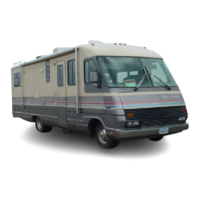Do you have a question about the Fleetwood 1997 Pace Arrow and is the answer not in the manual?
Details the warranty coverage for motor home components and defects.
Outlines owner responsibilities for maintenance and reporting issues.
Specifies the responsibilities of the dealer concerning pre-delivery and repair services.
Details the manufacturer's role in resolving issues not addressed by the dealer.
Lists exclusions from the warranty coverage, including specific components and causes.
Warns about formaldehyde in materials and other chemical hazards, advising ventilation.
Covers essential safety rules for handling LP gas, including fire and explosion risks.
Clarifies the manual's scope, optional features, and potential product changes.
Explains manual symbols and directs users to warranty information.
Describes the Owner's Package contents and dealer's predelivery inspection responsibilities.
Provides steps for resolving operational issues and contacting Fleetwood for assistance.
Details how to report vehicle defects causing crashes or injuries to NHTSA and Fleetwood.
Explains how to identify the vehicle using VIN, FIN, and Federal Certification Tag.
Discusses proper alignment and tire balance for vehicle handling and tire wear.
Illustrates and labels dashboard controls for Chevrolet chassis models.
Explains operation of lights, wipers, start switch, and climate controls.
Illustrates and labels dashboard controls for Ford chassis models.
Emphasizes loading responsibility, weight ratings (GVWR, GCWR), and key term definitions.
Provides guidelines and factors to consider when towing a trailer or another vehicle.
Details procedures for weighing the motor home to check load limits, with or without a trailer.
Offers practical advice on loading items, securing cargo, and warnings about vehicle modifications.
Discusses tire types, proper inflation, and safety checks for optimal tire life and vehicle stability.
Provides guidance on replacing tires, handling a flat tire, and safety precautions.
Explains proper seat belt usage and safety guidelines for child restraints.
Offers advice on operating the motor home, considering its size, weight, and maneuvering.
Explains how to use engine braking for speed control on downgrades and various road conditions.
Discusses fuel systems, vapor lock, and critical carbon monoxide safety precautions.
Provides crucial instructions and cautions for towing the motor home safely.
Explains leveling system, power entry step, and remote mirror controls.
Describes entry doors, windows, emergency exits, sun visors, and interior storage.
Covers interior materials, dinette/sofa conversions, and lighting.
Discusses effects of long-term occupancy, climate control, and condensation management.
Covers general fire prevention, extinguisher use, and smoke detector importance.
Explains the purpose of slide-out rooms and cautions against moving the vehicle with them extended.
Introduces the fresh water system, including hookup, filling, draining, and pump.
Details water filter maintenance, low point drains, and troubleshooting leaks.
Outlines sanitizing procedures and describes the exterior shower fixture.
Covers waste water tanks, toilet, sewer connections, and draining procedures.
Offers tips for minimizing clogging and maintaining holding tanks.
Details chassis and Fleetwood 12-volt systems, including batteries and fuses.
Provides instructions for checking battery condition, cleaning, and safety charging precautions.
Explains the solar panel function and how to use the auxiliary start system.
Covers the 120-volt AC system, power converter, and GFCI protection.
Details starting, stopping, and safe operation of the generator, including fuel supply.
Describes the climate control system and notes the scope of wiring diagrams.
Identifies electrical panels and illustrates the overall system layout.
Shows a diagram of LP gas tank installation and identifies its components.
Provides critical safety guidelines for handling LP gas, including leak detection and general precautions.
Lists system components and discusses LP gas performance at low temperatures.
Provides steps to prevent freeze-up and details tank filling procedures.
Describes LP leak detector operation and recommendations for lighting LP gas appliances.
Explains operation of water heater, bypass valve, and refrigerator, including leveling.
Covers furnace, range/oven, exhaust hood, and air conditioner functions and safety.
Describes entertainment equipment like VCRs, TVs, and their power sources.
Discusses interference sources and additional appliances.
Discusses fiberglass finish care, washing, waxing, and stain removal.
Covers care for windows, doors, roofs, interiors, fabrics, and engine access.
Presents a checklist, wiring diagrams, sealants, and filters for maintenance.
Lists bulb types and identifies fuse/breaker panels and their ratings.
Introduces checklists for preparing the motor home for storage.
Details procedures for short-term and long-term storage, including engine and battery care.
Explains the importance of winterization for preventing damage and lists key procedures.
Provides detailed steps for winterizing the water system, including draining and antifreeze use.
Provides a checklist for reactivating the motor home after a period of storage.
Outlines checks for systems, appliances, and sealants after storage.
Defines terms like AC Inverter, Belted Seating, Black Water Tank, and Chassis Manual.
Defines FIN, GAWR, GCWR, Gear Preselection, and GFCI.
Defines Gray Water Tank, GTW, GVWR, ICC Switch, Monitor Panel, MTW, and Note.
Defines Owner's Package, Ownercare Card, Park Cable, Power Cord, Predelivery Inspection, and Roadside.
Defines UVW, VIN, and Warning.
| Make | Fleetwood |
|---|---|
| Model | Pace Arrow |
| Year | 1997 |
| Class | A |
| Category | Motorhomes |
| Fuel Type | Gasoline |
| Sleeping Capacity | 6 |
| Gray Water Capacity | 50 gallons |
| Gross Vehicle Weight Rating (GVWR) | 18000 lbs |
| Horsepower | 290 |
| Transmission | Automatic |











